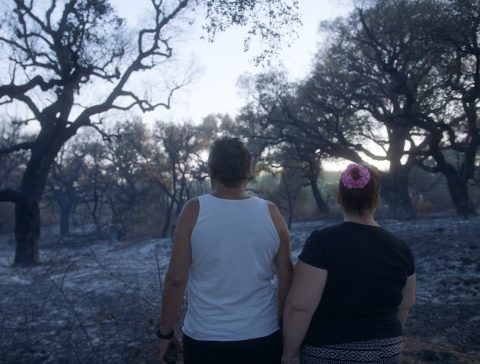When I think of American imperialism, the big things come to mind: CIA-backed coups in South America, the conquest of Hawaii or the invasion of Iraq. But American imperialism snakes through large swathes of Europe as well, with bases and installations across the United Kingdom, Germany and Italy. And no matter what local people think, no matter how hard they protest, their land will be used to maintain a global, unstoppable war machine.
The MUOS in Competition entry Valentina and the MUOSters (Francesca Scalisi, 2024) stands for Mobile User Objective System. It refers to a series of high-tech satellite systems designed by Lockheed Martin. One of the largest bases is near the small town of Niscemi in Sicily, with large satellite dishes that bring to mind Robert Zemeckis’ Contact (1997). But rather than inspiring wonder about the outside world, they seem to blot out the landscape, interfering with everyday life.
This sensitive documentary zeroes in on one Sicilian woman under threat from American expansionism. Finely threading the needle between critique and poetry, realism and lyricism, Scalisi’s nuanced documentary feature counts the human cost of life under the shadow of military might.
The eponymous Valentina is almost 27, overweight, still lives with her parents and doesn’t have a job or a boyfriend. She’s an exceptionally sensitive and caring woman, often bursting spontaneously into tears. There are very few jobs available in her town, which she cannot leave anyway due to familial obligations.
Her father, Salvatore, has high blood pressure and wears a pacemaker, meaning he cannot legally drive, meaning that she spends much of her time ferrying him around for doctor’s appointments. One doctor, sporting No to MUOS stickers in his office, even suggests that the radio waves from the American base might be harming his pacemaker’s functionality. And on these trips to and from the doctor, they are stopped by military men, asking them constantly for their ID.
The locals protest, chanting: “From Sicily to Palestine, one voice: murderous America.” Later television reports suggest that drones sent to Ukraine are monitored from the Niscemi base, provoking anxiety amongst Valentina’s family that Sicily — a land that has been invaded by everyone from the Greeks to the Arabs to the Spanish — will be dragged into yet another war. But ultimately, nothing changes. The locals will simply have to live with an unwanted American base in their homeland.
What makes Valentina and the MUOSters so compelling is the way that its critique is folded within an expressive film language, utilising a tight 4:3 ratio, carefully framed takes and a keen eye for contemplative moments — simply allowing Valentina to exist in her home town, whether swimming in the pool, staring at a tree or talking with her older, more successful sister. This film would work simply as a heartfelt story of arrested development, a life in perpetual limbo. Yet with the added presence of American ground satellites, Valentina and the MUOSters is imbued with a powerful political potency.
Redmond is the editor-in-chief of Journey Into Cinema.





